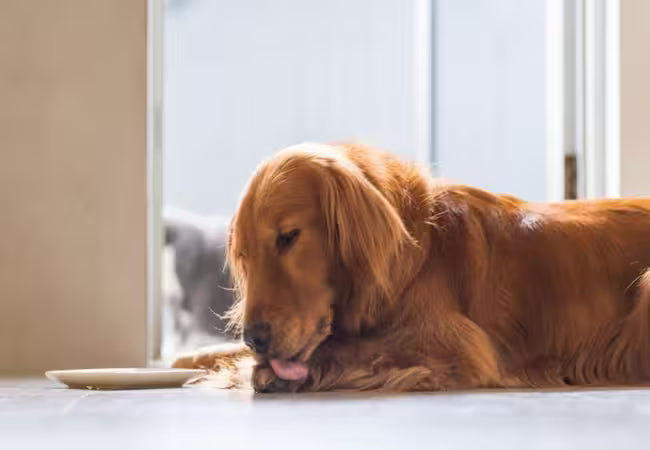2025 Vet Guide: Why Dogs Lick, Chew & Groom Excessively 🐶🩺

In this article
2025 Vet Guide: Why Dogs Lick, Chew & Groom Excessively 🐶🩺
By Dr. Duncan Houston BVSc
When a dog licks, chews, or grooms itself occasionally, it’s usually normal. But when it becomes obsessive—causing bald patches, wounds, or anxiety—it signals underlying issues that need attention. In this extensive guide, I'll walk you through the medical, behavioral, and environmental causes, treatment options, and practical tips. You’ll also see how services like Ask A Vet, Woopf, and Purrz can help you provide relief and long-term wellness for your dog.
🔍 1. What Counts as “Excessive” Grooming?
Veterinary dermatologists define excessive grooming as a compulsive behavior that a dog cannot self-control, even with negative consequences like irritated skin or disrupted daily routine. Signs include:
- Bald patches, matted fur, dandruff, or open sores
- Red, inflamed skin or oozing lesions
- Behavioral changes—moaning, pacing, or giving up playtime
- Excessive licking of paws, belly, genital/anal area, legs, or joints
⚠️ 2. Medical Causes
2.1 Pain or Injury
- Paw injuries (cuts, burns, broken nails) can lead to localized chewing
- Joint pain, arthritis—dogs may lick achy hips or elbows
- Hot spots (acute moist dermatitis) often result from infection and self-trauma
2.2 Parasites & Infections
- Fleas, ticks, mites, and lice cause intense biting/licking
- Bacterial or yeast skin infections can lead to itchiness and discharge
- Anal gland issues or parasites can cause licking near the rear region
2.3 Allergies & Dermatological Conditions
- Atopic dermatitis, food or environmental allergies cause widespread licking
- Contact irritations from chemicals or grass
2.4 Gastrointestinal or Systemic Disease
- GI disorders (IBS, pancreatitis, parasites) may drive compulsive licking behaviors
- Infections or metabolic issues may manifest through licking-associated sores or behaviours.
2.5 Lick Granulomas (Acral Lick Dermatitis)
These chronic lesions develop from repetitive licking of a spot, often the lower leg. They're painful, scarred, and frequently infected. Causes include:
- Pain or discomfort in the area
- Psychological stress—boredom, anxiety, compulsive behavior
🧠 3. Behavioral Causes
- Boredom or anxiety: Licking may be self-soothing
- Compulsive disorders: Licking even healthy skin, resembling OCD
- Attention-seeking: If licking gets your reaction, it may unintentionally reinforce the behavior
🩺 4. When to See the Vet
Book a vet visit if the behavior:
- Persists for days with skin damage
- Leads to open sores, oozing, or smelling
- Causes behavioral changes—sleep disturbances, lethargy
- It is focused on one spot like a lick granuloma
Veterinary assessment may include:
- Physical exam, skin scrapings for parasites
- Cytology/cultures for bacteria or yeast
- Pain evaluation, blood tests, GI screening
- Dermatologist consult for biopsy or allergy testing
💊 5. Treatment Options
5.1 Treat Underlying Medical Conditions
- Pain relief: NSAIDs or joint supplements for arthritis
- Parasite control: Flea/tick prevention, deworming
- Infection treatment: Topical/oral antibiotics or antifungals
- Anal gland care: Extraction and treatment of infection
5.2 Address Dermatological Issues
- Medicated shampoos, skin wipes, barrier creams
- Allergy management: antihistamines, steroids, Apoquel, Cytopoint
- Allergen immunotherapy if allergens are identified
5.3 Lick Granulomas:
- Topical anti-lick sprays or bandaging to protect the area
- Elizabethan collars or protective wraps
- Behavioral modification & environmental enrichment
- Drug therapy: SSRIs, tricyclics, naltrexone for compulsive licking
- Advanced options: steroid injections, laser therapy, surgery in severe cases
5.4 Behavioral & Environmental Support
- Increased exercise and mental stimulation—puzzles, training, walks
- Ignore attention-seeking licking behaviors
- Enrichment toys (Kongs, frozen treats) for anxious dogs
- Calming pheromone diffusers, consistent routines, and safe spaces
🏠 6. DIY & Home Care Strategies
- Regular grooming, keeping skin clean & dry
- Oatmeal baths or gentle skin washables to soothe irritation
- Protective coverings for inflamed areas
- Supplements: omega‑3/6 fatty acids can support skin health
🧩 7. Integrating Ask A Vet, Woopf & Purrz
Your holistic care plan can be enhanced with:
- Ask A Vet: Diagnostic chat, vet prescriptions, follow-ups
- Woopf: Treatment reminders, parasite prevention scheduling
- Purrz: Behavior tracking, enrichment planning, anxiety coping tools
📚 8. FAQ
Q: Can this behavior ruin my dog's quality of life?
If untreated, excessive licking can cause chronic pain, infection, and behavioral disorders. Early intervention is key.
Q: Should I scold my dog when they lick?
No—this can worsen anxiety or reinforce attention-seeking behaviors. Instead, redirect attention and reward calm behavior.
Q: When do you use medication vs behavior training?
Treat medical issues first; use behavior support and medication for compulsive cases or chronic anxiety.
Q: How long does it take to fix lick granulomas?
It can take weeks to months—combining medical care, protection, training, and enrichment improves outcomes. Recurrence risk remains if the root cause isn’t addressed.
💬 9. Real-World Wisdom
A dog parent shared on Reddit:
> “When we got a cone, he’d lick that too—so we used puzzles, meds, and vet care. It took patience, but the spot finally healed.”
This mirrors many success stories: comprehensive medical, environmental, and behavioral interventions work best.
🏁 10. Final Thoughts from Dr Houston
Excessive licking, chewing, or grooming is never "just grooming." It often signals deeper issues—pain, allergy, infection, or stress. A combination of medical evaluation, targeted treatment, enrichment, and professional guidance is the way forward. For persistent cases, reach out via Ask A Vet, track care with Woopf, and enrich behavior with Purrz. You don't have to face it alone.
Download the Ask A Vet app today to connect with experienced vets, get treatment reminders, and help your dog enjoy calm, healing comfort in 2025 and beyond. 🐾📱
AskAVet.com – Your partner in pet wellbeing. 📱






